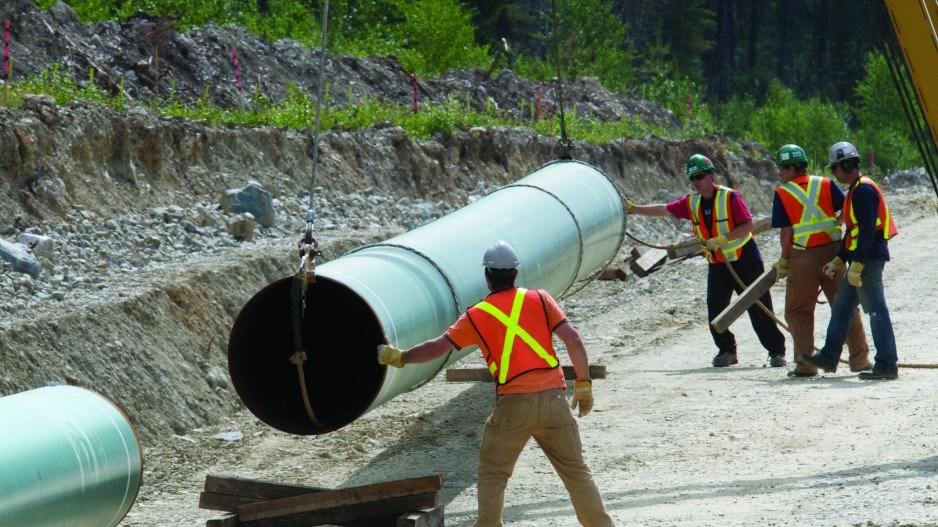On December 17, 2015, two years and one day after it applied to the National Energy Board (NEB) to twin its 1,150-kilometre Trans Mountain pipeline, Kinder Morgan Inc. (NYSE:KMI) made its final pitch to the NEB at a public hearing in Calgary.
Today (January 19) at a public hearing in Burnaby, interveners began giving oral arguments as to why the project should or shouldn’t proceed. The hearing will run through January 29 before resuming in Calgary in February.
The B.C. government is not among the interveners. However, just last week, it made a submission to the NEB that said it cannot support the project because the company has failed to meet the province’s five conditions, which include providing assurances it can provide “world-class” oil spill prevention and response.
A review process that was supposed to take 15 months has now passed the 22-month mark; the project’s estimated costs have ballooned from $5.4 billion to roughly $7 billion (thanks in part to a strong U.S. dollar); crude oil prices have crashed from US$100 per barrel to US$30, and a new Liberal government plans to overhaul the NEB regulatory process.
Whether that will happen by the May 20 deadline for the NEB to submit its final recommendations to the governor-in-council remains to be seen.
But the project still faces other challenges, including legal ones. The Tsleil-Waututh Nation, whose territory is around Burrard Inlet, where oil tanker traffic would increase from five vessels per month to 34, applied to the Federal Court of Appeal to halt the project on the basis the First Nation was not properly consulted.
Robin Junger, a McMillan LLP partner specializing in aboriginal law and former head of the B.C. Environmental Assessment Office, points to a similar First Nations challenge to the Site C dam – an appeal that was rejected by the courts – that demonstrates aboriginal court challenges are not necessarily the game-stoppers some might think them to be.
“In many cases, the filing of a court application is less likely to disrupt the project schedule than people think,” he said. “In the Site C litigation, the courts made clear that the governments do not have to get aboriginal approval of the consultation process. They just have to show that they consulted adequately.”
With both the Northern Gateway and Keystone XL pipelines doomed by national leaders in Canada and the U.S., the Trans Mountain pipeline now appears to be Alberta oil producers’ only hope for gaining new access to foreign markets.
Without it, they’re forced to sell landlocked oil at discounted rates to the U.S. Canadian oil producers estimate the pipeline expansion would increase their revenue by $73.5 billion over 20 years.
“There is a demand for our resources around the world, and right now Canadians are not getting the maximum value for our resources,” said Trans Mountain Expansion Project spokeswoman Ali Hounsell. “Getting more for our resources benefits everybody.”
At least one major oilsands producer – Suncor Energy (TSX:SU) – says the pipeline expansion is critical to its business. It is one of 13 companies that have signed long-term offtake agreements with Kinder Morgan to take up to 707,500 barrels per day (bpd) of the expanded pipeline’s capacity of 890,000 bpd.
Suncor already produces more than 420,000 bpd, and will increase its production by 180,000 bpd when its new Fort Hills oilsands project goes into production. Vancouver’s Teck Resources (TSX:TCK.B) has a 20% stake in that project.
“This expansion is critical to ensuring that Suncor has greater access to existing and new markets to support Suncor’s current and future volumes,” the company said in a written submission to the NEB.
Unlike the Northern Gateway pipeline, which is a greenfield project, Trans Mountain is an existing pipeline that would be twinned, with 89% of the new pipeline following the existing corridor.
It’s also the first major pipeline project to move through what was supposed to be an expedited NEB process.
Under amendments made in 2012, the NEB was given a 15-month time limit to make decisions and recommendations on major projects. But that hasn’t necessarily shortened the vetting process. Twice now, the NEB has stopped the clock on the Trans Mountain review.
Under the Stephen Harper government, the NEB was criticized for becoming overly politicized in favour of the oil industry. In a decision that prompted some interveners to withdraw in protest from the hearings, the board decided that it would not allow interveners to cross-examine Kinder Morgan.
Instead, interveners were asked to submit written “information requests.” The result has been a flurry of 17,000 written information requests, not all of which were answered to interveners’ satisfaction.
The B.C. government, for example, asked how many SCADA (supervisory control and data acquisition) alarms Kinder Morgan receives on its pipelines annually, and how many result in precautionary shutdowns.
SCADA are automated systems used in industrial infrastructure like pipelines, power stations and nuclear power plants. These systems use computer-controlled sensors, cameras, shutoff valves and alarms. On pipelines, they detect leaks and ruptures that can result in a pipeline being shut down. Kinder Morgan rejected the B.C. government’s information request, saying it was “not relevant.” The B.C. government disagreed.
“Information concerning the effectiveness of leak detection and the promptness of shutdowns on the existing TMPL system and all Kinder Morgan pipelines is directly relevant to the company’s ‘track record’ with respect to the safe operation of its pipelines,” it wrote to the NEB.
“The province requires such information in order to assess Trans Mountain’s ability to operate the proposed pipeline safely.”
The B.C. government cites the company’s refusal to answer its questions as one of the reasons it can’t support the project.
Interveners at the Burnaby hearings include 20 First Nations groups, a dozen municipal and regional governments and a number of landowners and environmental organizations that oppose the project.
The only interveners representing B.C. businesses at the Burnaby hearings are the Vancouver Board of Trade and the Independent Contractors and Businesses Association of B.C.




